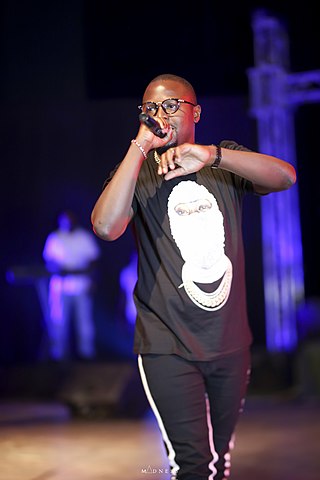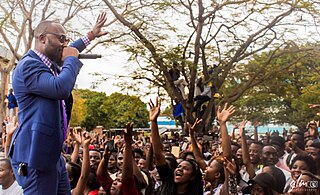Related Research Articles
Hip hop music has been popular in Africa since the early 1980s due to widespread African American influence. In 1985, hip hop reached Senegal, a French-speaking country in West Africa. Some of the first Senegalese rappers were Munyaradzi Nhidza Lida, M.C. Solaar, and Positive Black Soul.
The music of Malawi has historically been influenced by its triple cultural heritage of British, African, and American music. Malawians, known for their history as travellers and migrant workers, have contributed to the spread of their music across the African continent, blending it with various musical forms. A significant factor in this musical amalgamation was World War II, during which soldiers transported music to distant lands and brought it back, leading to the popularity of guitar and banjo duos as dance bands by the war's end. Both instruments were imported. Additionally, Malawians working in mines in South Africa and Mozambique influenced the fusion of music styles, giving rise to genres such as Kwela.
Limbani Kalilani is a Malawian hip hop artist better known by his stage name Tay Grin. In 2009 Tay Grin founded an Entertainment & Event Promotion company, which helps to promote events across Malawi. The company is known as Black Rhyno Entertainment. In 2014, Grin won a Black Entertainment Film Fashion Television and Arts (BEFFTA) award for Best International African Act. In 2016, he won the BEFFTA Star Award in the music category. He has performed at the annual Lake of Stars Music Festival. He also won the 2016 WatsUp TV Africa Music Video Awards Best Traditional Video award, with the Video Chipapapa featuring 2baba. He has also won numerous local awards like the Nyasa Music awards and the Urban Music People in categories such as best live act, best video and best Male artist. In 2018, he won the UMP Fashion awards for Most Fashionable Celebrity.
The Real Elements is a Malawian hip-hop band that gained notoriety in the 1990s and 2000s in Malawi. The group consisted of Marvel, Plan B, Stix, and Q. The group holds a special place in the Malawian music industry because it propagated Malawian hip-hop and paved the way for the Malawian hip-hop genre at a time when they were a few hip-hop artists in Malawi. Their music was considered the cutting edge in the Malawi music scene. Critics argue that is the best urban group that has come out of Malawi. They performed in Malawi and their music was also featured on Channel O beaming Malawian hip-hop for the first time to a Pan African audience. In their UK tours they opened for UK hip-hop artists like Blak Twang and Terri Walker. It was just as their international career was taking off that the group separated. Stix decided to leave the music industry and follow religious pursuits. The group currently is pursuing personal interests.
Francis Kaphuka known professionally as Hyphen and formerly as Young Kay is a popular Malawian hip-hop artist that is known for fusing local Malawian folk songs with international genres. He is known for his vibrant sound and ability to mix Chichewa and English lyrics eloquently in his rhymes. This has earned him recognition as one of Malawi's best lyricists. He has been voted as Malawi’s best rapper twice Joy FM fans and in 2021 was crowned King of Malawian Hiphop by the audience of one of Malawi's biggest online platforms, Mikozi Networks. He was introduced to Malawian audiences under Rush records with the single “I’m Home” and his popularity grew to solidify his place as one of Malawi's greatest hip-hop artists. He has had subsequent hits since then. His song “zipepese” number 2 on FM 101 Power’s urban music chart. In 2010 he collaborated with Malawian born rising act Onesimus Muzik on a track titled "Beautiful" He also collaborated with Lucius Banda, Tigris, and Maskal on track "Malawi Goodlife" in 2011.

Leo Siwale, known professionally by his stage name Tsar Leo, is a Malawian rapper, singer and songwriter. He was nominated as Malawi's Best New Artist of the Year for 2015.

Duncan Zgambo, professionally known as Gwamba, is a Malawi-born Rapper and Philanthropist.
ZaniMichelle Chiumia is a Malawian artist, actress, model and former TV presenter. She gained international recognition in music when she collaborated with a Nigerian reggae-dancehall singer and songwriter, Patoranking, on a song called "Single Tonight" released in 2016.
Kelvin Khuzumba popularly known as Nesnes is a Malawian rnb artist and song writer. He became popular after releasing songs such as Chidodo and It’s not fair in early 2010s. He featured Conel Chyoon and Lap T in the album which has songs like Chibwelele, Kadya Ubwelele, Sionse, Ndinjoye and Mundilanditse.
Chiyanjano Muheziwa popularly known as Annie Matumbi, and sometimes Nyakwawa, is a Malawian veteran musician, tv presenter, actor and politician. In 2017, Matumbi claimed he was the father of Malawi urban music. In 2018, Matumbi stood in a winning a parliamentary seat in 2019's general election under Democratic Progressive Party (DPP) Candidate for Lilongwe City South West constituency.
Dan Lufani, best known as Dan Lu, and sometimes written as Dan Lufan, is a Malawian Afro-pop singer and songwriter. In 2011, he was awarded as best Afro pop artist of the year in Malawi Music Awards. In 2016, he was nominated in best R&B/Afro-pop Act along with other artists such as Theo Thomson and Kell Kay.
Aubrey Ghambi, best known as Suffix, is a Malawian gospel rapper and songwriter. In 2020, he won a UMP Award in best gospel act. In 2018, his album titled "Before I Sleep" won the category Album of the Year in UMP Awards and he was nominated as Best Hip Hop Artist as well as Best Urban Gospel. In 2016, was nominated for the same category and award.
Fredo Penjani Kamlepo Kalua, best known as Fredokiss, is a Malawian rapper and songwriter. In 2020, he was nominated in UMP Award in Best Hip Hop Act and his music video "Dadada" won Music Video of the Year. In 2017, he won three categories namely, Artist of the Year, Best rapper and Best Live Act.
Kell Kay Kambwiri, best known as Kell Kay, is a Malawian RnB artist and songwriter. In 2017 and 2018, he won a Nyasa Music Award as Best R&B Artist of the year. His collaboration with Gwamba titled Mr yesu was nominated as the Best collaboration of the year 2018.
Angel Mbekeani, best known as Sangie, is a Malawian reggae artist and songwriter. In 2015, she won as the best female artist of the year in UMP Awards. In 2016 and 2019, she was nominated in the same awards in Best Female Artist of the Year. In 2017, she won in the same awards in Best Female Act.
Ku Mingoli Bash Festival is a Malawian music festival that features 10 Malawian artists and four international headliners. The 2024 bash will take place at Civo Stadium, Lilongwe, and will include South African artists such as Casper Nyovest and Young Stunna. Tay Grin is also a headliner, and the bash will also feature Temwa, a Malawian hip hop artist.
Shukuran Mwachumu better known by his stage name Janta, is a Malawian Afro Pop artist. In 2015, his song titled Wangongole won a Nyasa Music Award in Best Song of the Year category. In 2019, his music video won Best video of the year in UMP Awards.

Noel Chikoleka better known by his stage name Phyzix, is a Malawian musician, rapper, songwriter and activist. He gained national recognition in 2006 when he released the song titled "Cholapitsa" (boogeyman) which sold over 40, 000 copies national wide within a month and has released over 6 albums. In 2020, he won a UMP Award in Best Hip Hop artist of the year.
Maso Awards are Malawian music award show that was established in early 2019 to celebrate entertainers and other minorities in music, film, philanthropy and fashion. The event takes place in Malawian major cities and it is featured by performances from artists. They are one of the major Malawi's local music industry awards. The awards recognizes Malawian music from all genres, including gospel. The awards also promote culture and encourages people to showcase their talents. The awards categories are split into male and female.
The Malawi Music Awards are Malawian national awards that stands as an annual hallmark event within Malawi's music industry that recognizes and celebrates outstanding achievements in the Malawian music industry. The event is organized by the Music Association of Malawi (MAM) and is considered one of the most prestigious music awards in the country. During its establishments in the early 1990s, the awards had been primary aiming at recognizing and honouring the contributions of Malawian musicians towards the advancement and enrichment of the nation's music scene. The events serve as a platform to celebrate the talents and achievements of Malawian artists who have played vital roles in shaping and expanding the local music.
References
- 1 2 "How Malawi hip hop made it on radio – where we stand - Malawi Nyasa Times - News from Malawi about Malawi". www.nyasatimes.com. 2015-12-25. Retrieved 2022-02-28.
- ↑ "Phyzix dominates Hip-Hop awards nominations list". The Nation Online. 2020-10-29. Retrieved 2022-02-28.
- ↑ "Malawi Hip Hop is in Good Hands with C-Scripture". CentralSauce Collective. 2021-05-27. Retrieved 2022-02-28.
- ↑ "Malawi Africa's Christian Hip-Hop Scene is Alive and Well - Suffix". Rapzilla. 2018-05-09. Retrieved 2022-02-28.
- ↑ "Reintroduction of Spokes the man – Game Theory album officially out! - Malawi Nyasa Times - News from Malawi about Malawi". www.nyasatimes.com. 2021-05-23. Retrieved 2022-02-28.
- ↑ "FredoKiss becomes a UNICEF Malawi Champion for Children". www.unicef.org. Retrieved 2022-07-28.
- ↑ Samati, Gary (September 6, 2021). "Phyzix is face of Kelfoods". Times Malawi.